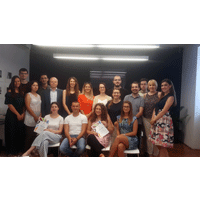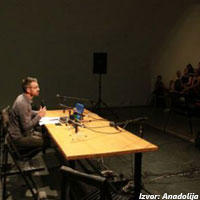Sixth Transitional Justice School
 From November 5 to 10, 2019, the Sixth Transitional Justice School (TJ School) of the Humanitarian Law Center (HLC) was held. The TJ School was attended by 18 students of law, political science, history, Scandinavian languages and sociology, as well as activists from Serbian non-governmental organisations.
From November 5 to 10, 2019, the Sixth Transitional Justice School (TJ School) of the Humanitarian Law Center (HLC) was held. The TJ School was attended by 18 students of law, political science, history, Scandinavian languages and sociology, as well as activists from Serbian non-governmental organisations.
The participants gained knowledge about the concept and mechanisms of transitional justice, and its application in Serbia in the context of the armed conflicts in the former Yugoslavia, with a consideration of case studies of crimes committed in Bosnia and Herzegovina, Croatia and Kosovo. In addition to the opportunity to learn the facts established before the International Criminal Tribunal for the former Yugoslavia (ICTY), the participants had the opportunity to hear about the results and challenges of war crimes prosecutions before the courts in Serbia, Croatia, BiH and Kosovo. Besides learning about the facts established before the ICTY and national courts, the participants also had the opportunity to learn about topics related to institutional reform, lustration, and reparations, as well as topics related to memorialisation.












 The third National School of Transitional Justice was opened on the premises of the Humanitarian Law Center’s (HLC) Library on Thursday, March 24th, 2016, with a lecture on establishing justice for war crimes committed in the post-Yugoslav states. The School was opened by Ms. Marijana Toma, the HLC Education Programme Director. The National School of Transitional Justice is a two-month programme of informal education on instruments for dealing with the past, organized and implemented by the HLC as part of its Education Programme.
The third National School of Transitional Justice was opened on the premises of the Humanitarian Law Center’s (HLC) Library on Thursday, March 24th, 2016, with a lecture on establishing justice for war crimes committed in the post-Yugoslav states. The School was opened by Ms. Marijana Toma, the HLC Education Programme Director. The National School of Transitional Justice is a two-month programme of informal education on instruments for dealing with the past, organized and implemented by the HLC as part of its Education Programme.  On Monday December 10th, 2012, namely the International Human Rights Day, the diplomas were awarded to the second generation of the Transitional Justice School students.
On Monday December 10th, 2012, namely the International Human Rights Day, the diplomas were awarded to the second generation of the Transitional Justice School students.